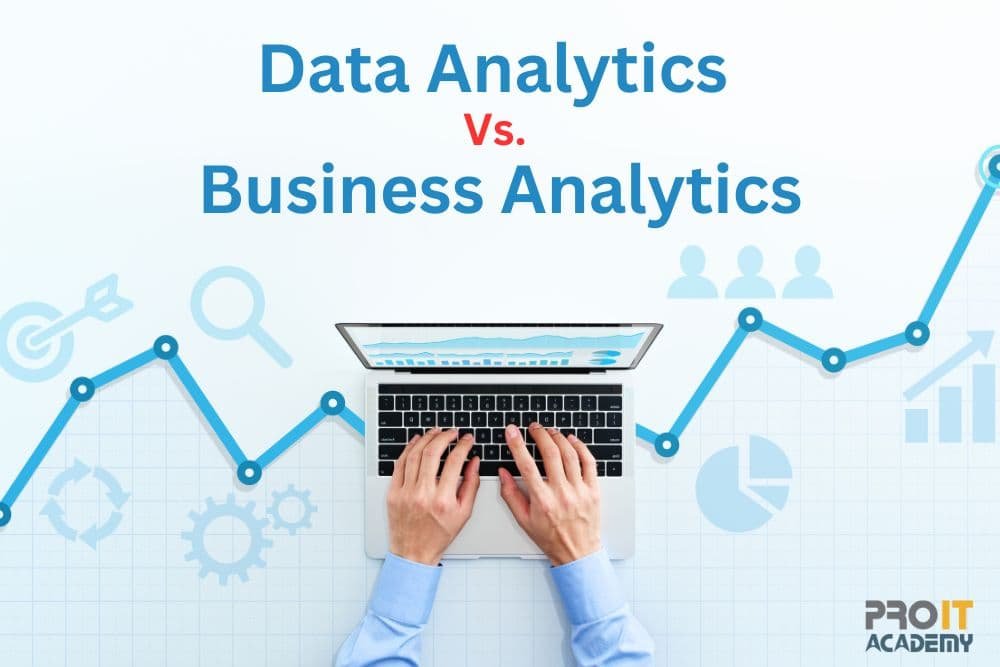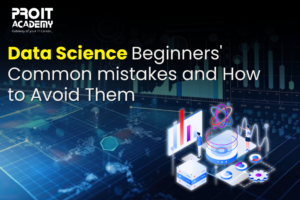Transformation of big data is common in many education organizations, companies, and government agencies. This helps the organizations to attain their goal, increasing the sales, making the operation efficient, and introducing new products as well as services.
In order to use the big data in an effective manner by the companies, both data analytics and business analytics play a very important role. Often it is seen that people are confused about data analytics and business analytics. Here, we are trying to clear this confusion so that you can decide in a better manner to choose one among them.
Generally, there are few dynamic differences between business analytics and data analytics because both of them have their own prominence. For example, data analytics is used for making important decisions while identifying different observations and patterns. On the other hand, business analytics is meant for creating data-driven and realistic business decisions by evaluating different information.
The debate of data analytics vs. business analytics is a quite interesting and attracts a glimpse of analysts. There are multiple factors involved in explaining the difference in a better way. Let’s get started.
What is Data Analytics?
The fundamental behind data analytics is to use data compelling in a captivating way so that organizations can make the right decision. The responsibility of a data analyst is –
- Cleaning data at the time of analysis preparation.
- Designing and maintaining various databases and data systems. Also, they have to troubleshoot the possible issues.
- Making reports that can easily communicate with the findings.
Hence, it is important that data analysts should have the technical skills like data visualization and presentation skills required for data mining and analysis.

Book Your Time-slot for Counselling !
What is Business Analytics?
Business analytics is defined as a process of using data to take strategic business decisions. The business analyst will have to –
- Evaluate numerous business processes to check efficiency, valuable metrics, and cost.
- Frequent communication with the business teams and stakeholders to give insight.
- Planning strategic recommendations needed for the procedure, process adjustments, and improvements in performance.
To be a successful business analyst, it is essential that a person should possess skills like problem solving, communication, critical thinking, and process improvement. The professionals can easily understand the goal and procedures of an organization so as to identify the inefficiencies and how to implement the solutions. They also have the acquaintance of working with the latest technology introduced in business analytics.
What’s the difference between Data Analytics and Business Analytics?
To understand the real business analyst and data analyst difference, it’s time to take a deeper dive.
- Focus
Talking about the focus, both of them are quite different but still overlap in some parts. Firstly, the data analytics generally emphasizes on collecting business data and using SQL querying and program code for manipulating data. Those who are working as data analysts work by checking data quality and trying to improve the data management processes via automation. This can be done by sharing the business insight with the team in form of data dashboards and reports.
Whereas, the business analytics role start from where the work of data analytics end. It usually focuses on finding the patterns and data trends for correlating them with patented BI information. Also, it acts as a superset of data analytics. That means business analytics work with data analytics to predict the modeling and forecasting with the help of the right analysis, decision trees, and neural networks.
- Data quality
When it comes to data quality, data analytics offer data that is open to interpretation while opening different theoretical possibilities and probabilities.
The actual study starts when business analytics collects the information and analyzes them properly for innovation and problem solving. Hence, it offers the truth to stakeholders.
- Data management
Data management is all about combining and maintaining the structure of an organization’s data. Here, the data analyst works by handling complex data sets and designing data modeling workflows. This can be completed by identifying different patterns and trends that help in taking the right business decision.
Business analytics on the other hand include a relative study of data that is already get structured and visualized via data analytics. Therefore, this analysis is helpful in making the improvement of requirements and making business strategies. Moreover, business analytics assist you in planning for upcoming business modeling.

- Data modeling
If you want to know the answers to questions like ‘what is going to happen’, what we can do why it happened and others; then data modeling is a real help. It is defined as a process where data scientists use data models for predicting future trends to meet business requirements. Creating a data model usually requires various variables, attributes, and methods along with data manipulation techniques such as classification, clustering, and regression.
Actually, data modeling can easily serve both business analytics and data analytics. So, it is an excellent way to take a peek into future data trends and foretell future outcomes.
- Process
It’s the job of a data analyst to perform an explanatory analysis and further work on data mining. This helps in getting a good visual presentation of collective data.
Business analytics involves the comparative and static study of data as compared to data analytics.
- Transformation
In data analytics, the transformation is performed based on the in-database whenever there is a high demand for data.
While, in business analytics, the data is carefully transformed in an upfront manner after proper planning.
ProIT Academy provides the best Data Analytics course in Pune with sessions led by the smartest minds in the industry.
Whose salary is more – Data Analysts or Business Analysts?
The question now comes as business analyst vs. data analyst salary – which one is better?
Despite the difference, a salary of business analysts and data analysts is almost similar. In the United States, data analysts earn around $61K and range from $43K (entry-level) to $85K (senior level).
Focusing on the business analyst’s salary starts from somewhere around $61K. Usually, the salary ranges between $45K to $82K, completely depending on the skill set of an individual.
The difference in salary is very minimal, so if you are planning to make a career as a data analyst or business analyst, you can select as per your interest and skills.
Skills needed to become a data analyst or business analyst
Someone who wants to become a business analyst should have Bachelor’s degree in business or similar to that or an MBA. There are certain skill sets should be there in individuals.
Most important is the communication skills with development teams and stakeholders.
- Proficient in working with tools like Google Suite.
- Should have the knowledge of task management software such as Jira and Trello, Gantt charts, and Freshdesk.
- Have expertise in Microsoft Word and Excel.
- Should know technical documentation for creating presentations and reports.
- Should have a mindset of solving problems, managing the time, and organizational skills.
To pursue your career as a data analyst, you should have a Bachelor’s or Master’s degree in computer science, economics, statistics, or mathematics. Moreover, it is also important to have skills like –
- Knowledge of basic programming especially SQL, R, Spreadsheets, and Python.
- Excellent understanding of reporting packages and has experience in data modeling.
- Expert in data visualization and business intelligence.
- Must be able to use tools like Looker, Tableau, and Microsoft Power.
- Possess an analytical mind and should be able to solve the problems.
So, no matter which career path you choose: Business analyst or Data analyst; it is important that you should learn the technology at the best.

Do you need help to create your career path ?
The final words
Depending on the business requirements and resources, tools and techniques change to complete the project. Data analytics and Business analytics are different disciplines, yet not exclusive. As per the recent developments, there can be a large shift depending on how data is analyzed. Most companies have to deal with big data and get the opportunity to explore different kinds of data to take the right decisions.
The debate on business analyst vs data analyst which is better is authentic but both have their own part of the contribution to the growth of a company. Additionally, the employees can expect enormous scopes to learn the skills and match with the recent developments. Nowadays, analytics is much more than survey data and statistics. Data and learning trends are changing with time, so companies are completely trusting both data analytics and business analytics.
Learn all fundamentals and essential facts about Data analytics courses in Pune at ProIT Academy and get ready for the new age job profile in leading IT sectors.












